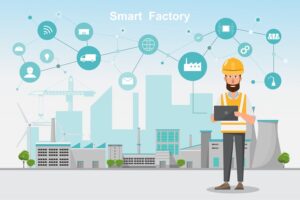A smart factory is a manufacturing facility where machines communicate efficiently, processes are optimized in real-time, and production efficiency reaches new unseen heights.
In 2022, the global smart factory market size was valued at USD 129.74 billion. It is projected to reach approximately USD 321.98 billion by 2032, with an annual growth rate (CAGR) of 9.52% from 2023 to 2032.
This statistic implies that a smart factory is a smart choice for one who wants to be successful in the field of business. In this journey one needs to understand the concept first.
This blog discusses the definition of smart factory and its important benefits.
Definition of smart factory
It is an interconnected network of machines, computing power, and communication mechanisms. It is a cyber-physical system which analyzes data, drives automated processes, and learns as it goes by using advanced technologies such as ML and AI.
Smart factories are called the future's factories. These factories operate with less human intervention.
Improving operational performance and immediately responding to supply and demand fluctuations is the main objective of smart factory manufacturing.
Characteristics of a smart factory
- Integration of IT (Information Technology) and OT (Operational Technology)
- Customized Manufacturing (Lot size one)
- Informed Decision-Making by using advanced Data Analysis
- Integration with Supply Chain Operations
What are the important benefits of a smart factory?
-
Minimal Costs
In smart factories, a smaller number of employees are required, hence it reduces costs. Also, human errors, waste material, and product defects are decreased, this leads to minimal costs. Along with that one can extend the life cycle of machines through predictive maintenance, this helps in saving money.
-
Improves efficiency
Here, efficiency refers to manufacturing efficiency. It depends on the effectiveness and quality of the completed work. Smart factory technologies improve efficiency through automating repetitive tasks, minimizing wasted time, reducing wasted material, and reducing downtime.
-
Better decision making in less time
Executives, managers and workers can make more exact, informed, and impactful decisions at the right time because of smart factory technologies.
-
Reduces environmental impact
In smart factories materials are used more efficiently with the help of connected and intelligent technologies. This leads to production of minimum waste material and hence reduces environmental impacts.
-
More work with fewer employees
In smart factories, people play an important role. But automated processes allow manufacturers to complete greater amounts of work with lesser number of employees.
-
Improved worker safety
The International Society of Automation reports says that automated devices and robots can help to reduce a total of 3 out of 5 leading causes of workplace injuries. This simply means that smart factories ensure worker safety by using the latest technologies.
-
Enhanced product quality
In smart factories, one can see end-to-end visibility and cloud connectivity. Also, in these factories all tiers of the manufacturing process get real time recommendations and insights. This leads to enhanced product quality.
-
Enriched customer experience
Because of new technologies and skillful employees, smart factories produce up to date products which makes customers happy. Hence, smart factories ensure enriched customer experience.
What are the challenges of a smart factory?
-
Risk of cybersecurity
There is increased connectivity in smart factories, it leads to a higher risk of cyber-attacks. These attacks can destroy sensitive data and disrupt the operations. So, to keep the integrity of the smart factory systems having strong cyber security measures is very important.
-
Greater implementation costs
As new and advanced technologies are used in smart factory systems, it increases the cost of implementation for small as well as for medium sized businesses.
These costs include initial stage spending on hardware and software and the cost of maintenance, upgrades and training of employees' costs.
-
Data integration issues
To realize the vision of smart factories of an optimal linked production and digital supply network, it is necessary to manage vast quantities of data from many sources across various sectors and formats.
What is the future of smart factories?
The future of smart factories is very promising. It is driven by advancements in AI, IoT, and robotics. These technologies enable real-time data analytics, enhanced automation, predictive maintenance, and leading to increased efficiency and reduced downtime.
Smart factories will also focus on sustainability, using energy-efficient processes and reducing waste. As industries accept these smart factory technologies, we can expect quicker, more responsive, and cost-effective manufacturing environments.
For more informative content in the world of technology, visit us at KnowledgeNile!
You May Also Like:






